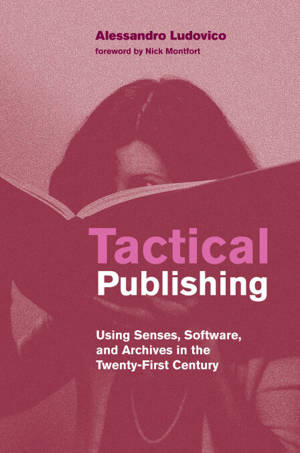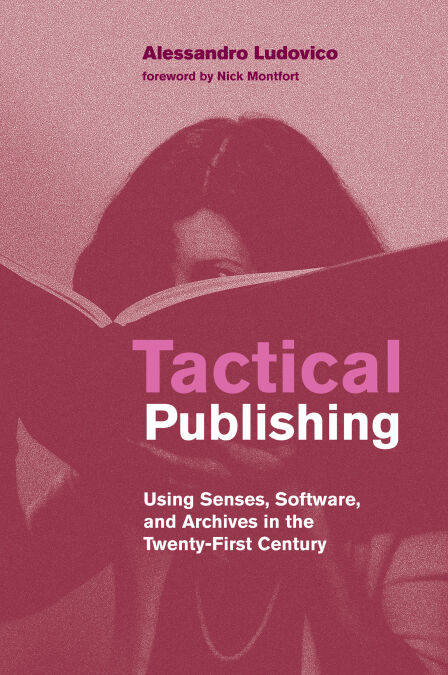
- Retrait gratuit dans votre magasin Club
- 7.000.000 titres dans notre catalogue
- Payer en toute sécurité
- Toujours un magasin près de chez vous
- Retrait gratuit dans votre magasin Club
- 7.000.0000 titres dans notre catalogue
- Payer en toute sécurité
- Toujours un magasin près de chez vous
Tactical Publishing EBOOK
Using Senses, Software, and Archives in the Twenty-First Century
Alessandro Ludovico
Ebook | Anglais
49,28 €
+ 49 points
Description
How to level up to the next transformative phase of publishing—with a critical methodology that transcends the dichotomy of paper and digital media production.
Publishing is experiencing one of the most transformative phases in its history. In Tactical Publishing, a sequel to Post-Digital Print, Alessandro Ludovico explores the forces driving this historical phase, highlighting the tremendous opportunities it presents. Our task, he believes, is to develop an alternative publishing system that transcends the dichotomy between paper and digital media. He focuses first on the two activities on which publishing is premised—reading and writing (with an emphasis on writing machines and post-truth in the latter)—and then deconstructs the concept, proposing alternative strategies inspired by recent practices and unconventional uses of technology.
Ludovico shows how the radical and strategic use of print in the past can serve as the basis for our transition to the next phase of publishing. He argues that the new ecology of publishing should be based on three main elements: the stimulation of our senses, the role of software in forming the publishing infrastructure, and the importance of archives. During this transition from the current post-digital phase to the next phase, independent publishers and artists, as well as readers and machines, will enable new structures and actions that realize the potential of publishing and the preservation of content, thereby enriching social practices. The author also considers the crucial social role played by new forms of libraries, as artists and publishers shape the coming publishing world in its various manifestations. Combining analytical accounts of tactical strategies with examples from artworks and experimental practices, the book concludes with a manifesto for publishing in the twenty-first century and an appendix with a selection of one hundred publications representing the “periodic table” of future publishing.
Publishing is experiencing one of the most transformative phases in its history. In Tactical Publishing, a sequel to Post-Digital Print, Alessandro Ludovico explores the forces driving this historical phase, highlighting the tremendous opportunities it presents. Our task, he believes, is to develop an alternative publishing system that transcends the dichotomy between paper and digital media. He focuses first on the two activities on which publishing is premised—reading and writing (with an emphasis on writing machines and post-truth in the latter)—and then deconstructs the concept, proposing alternative strategies inspired by recent practices and unconventional uses of technology.
Ludovico shows how the radical and strategic use of print in the past can serve as the basis for our transition to the next phase of publishing. He argues that the new ecology of publishing should be based on three main elements: the stimulation of our senses, the role of software in forming the publishing infrastructure, and the importance of archives. During this transition from the current post-digital phase to the next phase, independent publishers and artists, as well as readers and machines, will enable new structures and actions that realize the potential of publishing and the preservation of content, thereby enriching social practices. The author also considers the crucial social role played by new forms of libraries, as artists and publishers shape the coming publishing world in its various manifestations. Combining analytical accounts of tactical strategies with examples from artworks and experimental practices, the book concludes with a manifesto for publishing in the twenty-first century and an appendix with a selection of one hundred publications representing the “periodic table” of future publishing.
Spécifications
Parties prenantes
- Auteur(s) :
- Editeur:
Contenu
- Nombre de pages :
- 336
- Langue:
- Anglais
Caractéristiques
- EAN:
- 9780262362078
- Date de parution :
- 16-12-24
- Format:
- Ebook
- Protection digitale:
- Adobe DRM
- Format numérique:
- ePub

Les avis
Nous publions uniquement les avis qui respectent les conditions requises. Consultez nos conditions pour les avis.






